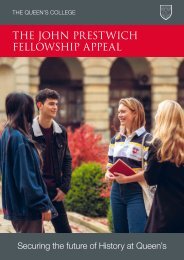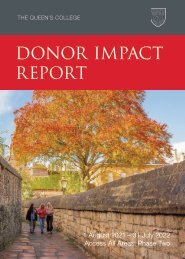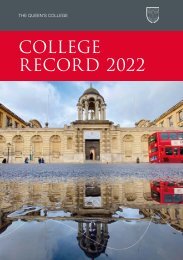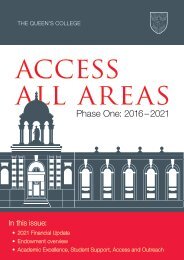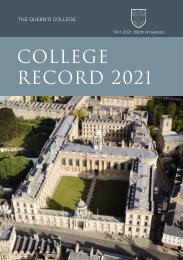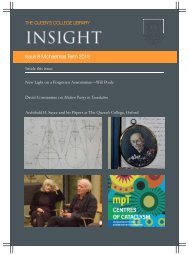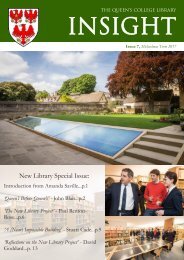The Queen's College Record 2023
You also want an ePaper? Increase the reach of your titles
YUMPU automatically turns print PDFs into web optimized ePapers that Google loves.
Credit: John Cairns<br />
FROM THE BURSAR<br />
Dr Andrew Timms<br />
Bursar<br />
<strong>The</strong> past financial year was dominated by concerns about<br />
inflation. Energy costs were initially the main worry: they<br />
had doubled (from roughly £450k to £900k per annum in<br />
an overall operating budget of nearly £11m), and forecasts<br />
ranged from the troubling to the terrifying. However, as the<br />
year wore on it became clear that the budgeted expenditure<br />
on this front was unlikely to be exceeded. This meant that<br />
we could get back to a more traditional worry—pay. <strong>The</strong><br />
cost-of-living crisis has bitten the <strong>College</strong>’s employees<br />
particularly hard: Oxford is an acutely expensive city in<br />
which to work and live (particularly in respect of housing<br />
costs). <strong>The</strong> <strong>College</strong> accelerated several pay awards and in particular brought forward<br />
by several months its implementation of the annual increase in the Oxford Living<br />
Wage, which is an enhanced version of the national Living Wage Foundation wage<br />
for those earning the lowest salaries in <strong>College</strong>. Our lowest-paid workers have<br />
therefore probably not seen their pay eroded in real terms, but, as is common across<br />
society as a whole, many other employees are poorer now than they were a couple<br />
of years ago, and this comes against a particular backdrop of longstanding concerns<br />
about academic pay and conditions. <strong>The</strong> challenges on this front are very<br />
considerable.<br />
Reports and <strong>College</strong> Activities<br />
When I became Bursar, my predecessor told me that the <strong>College</strong>’s financial<br />
model was well positioned for periods of high inflation. <strong>The</strong> general idea is that an<br />
endowment that is heavily invested in equities will retain its purchasing power. This<br />
sounds plausible but it is not hard to find historical periods when it has not worked<br />
well. That is one way of introducing the performance of the endowment, which<br />
generated a total return of around 8%; this return comprised solid equity growth<br />
(we are almost exclusively a passive investor nowadays: discuss!), a small decrease<br />
in commercial property valuations, and a notable uplift in agricultural property.<br />
<strong>The</strong> latter relates in particular to the disposal of two parcels of land for residential<br />
development at Keresley, Coventry, which occurred after the year-end and is a<br />
pleasing conclusion to many decades of careful and patient work by the <strong>College</strong> and<br />
my predecessors. My working rule is that if an investment goal takes X decades to<br />
be achieved, the Fellows will take X minutes to plan to spend it: in that sense it may<br />
be reassuring that we have maintained our methodical and disciplined approach to<br />
the financial management of the <strong>College</strong>, noting that ‘windfalls’ like Keresley (which<br />
will generate receipts of some £25m) simply increase the amount of income the<br />
<strong>College</strong> can sustainably draw from its investments. Slow and steady wins the race.<br />
<strong>The</strong> word sustainably in the preceding paragraph points to another growing concern.<br />
<strong>The</strong> <strong>College</strong> does not currently have an express policy on environmental sustainability<br />
<strong>College</strong> <strong>Record</strong> <strong>2023</strong> | <strong>The</strong> Queen’s <strong>College</strong> 35









